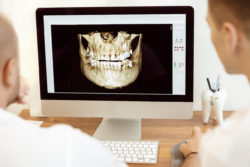
Thanks to public service announcements and the mandatory Surgeon General’s warning on packs of cigarettes, most people are aware that smoking and using tobacco products has a negative impact on your overall health. The increased risk of developing lung cancer, breathing problems, chronic obstructive pulmonary disease (COPD) and other conditions are well documented. However, it is not as well-known that smoking and tobacco products are specifically bad for the health of your mouth and teeth.
How Does Tobacco Affect My Teeth?
Smoking cigarettes slows down your natural ability to heal, causing your teeth to wear down faster. Additionally, cigars, chewing tobacco, snuff and unprocessed tobacco leaves (used as cigar wrappers) all contain tiny abrasive particles that are damaging to tooth enamel.
Smoking and tobacco use also hinder the success of many dental treatments because the effects of smoking on your mouth include reduced blood flow, increased bacteria and inflammation. These issues can cause complications when healing from root canals, dental implants and other dental surgeries.
For example, implants and bridges might not be an option for a longtime tobacco user because your surrounding teeth and jawbone may have weakened from infection or decay and aren’t strong enough to support these procedures. According to research, the implant failure rate for smokers was almost 16 percent, compared to just 1.4 percent in nonsmokers, due to slower healing and more susceptibility to infection.
Treating Gum Disease is Harder
Research shows that smokers are twice as likely to develop gum disease than non-smokers. Furthermore, since smoking stunts your immune system’s ability to fight infection, using tobacco products can turn a simple infection into an abscess or even sepsis. Additionally, smoking also stunts the growth of blood vessels, which means less blood flow to the gum tissues which slows healing after oral surgery.
What about chewing tobacco?
Smokeless tobacco (also known as snuff or chewing tobacco) is a primary cause of cancers of the mouth, lip, tongue and pancreas. Like cigarettes, snuff contains at least 28 cancer-causing chemicals and can cause issues including:
- Increased risk of cancer of the voice box, esophagus, colon and bladder due to swallowing toxins in the juice created by chewing.
- Irritation of your gum tissue, which can lead to gum (periodontal) disease.
- Increased risk of tooth decay since sugar is often added to enhance the flavor of chewing tobacco.
- Tooth sensitivity and erosion of enamel due to sand and grit from smokeless tobacco wearing down teeth.
What can I do?
If you’re a smoker, you can begin by understanding that tobacco dependence is an addiction disorder. All aspects of nicotine addiction, including both the psychological and physiological ones, need to be addressed in order to break the habit. Smokers must often make several attempts at quitting several times before they succeed but you don’t need to do it alone. If you’re a smoker, work with both your medical doctor and your dentist to create a plan that can help you quit for good.
To sum up: the effects of smoking and using tobacco products on teeth can increase risk of tooth decay, gum disease and create difficulties utilizing restorative dentistry. For more information or help restoring your smile from the damage caused by tobacco use, schedule with Dr. J. Stephen Hoard of New Bern, NC by calling (252) 507-0373 or schedule online today.
